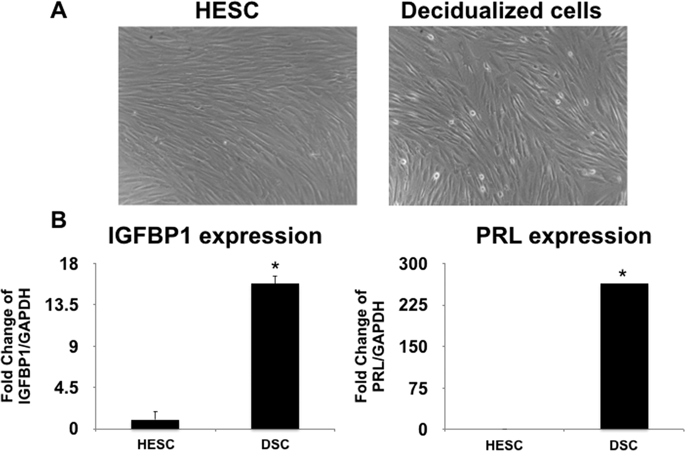Our official English website, www.x-mol.net, welcomes your
feedback! (Note: you will need to create a separate account there.)
Human Chorionic Gonadotropin modulates CXCL10 Expression through Histone Methylation in human decidua.
Scientific Reports ( IF 3.8 ) Pub Date : 2020-04-01 , DOI: 10.1038/s41598-020-62593-9 Michelle Silasi 1 , Yuan You 1, 2 , Samantha Simpson 1 , Janina Kaislasuo 1, 3 , Lubna Pal 1 , Seth Guller 1 , Gang Peng 4 , Rosanna Ramhorst 5 , Esteban Grasso 5 , Shervin Etemad 1 , Sandy Durosier 1 , Paulomi Aldo 1 , Gil Mor 1, 2
Scientific Reports ( IF 3.8 ) Pub Date : 2020-04-01 , DOI: 10.1038/s41598-020-62593-9 Michelle Silasi 1 , Yuan You 1, 2 , Samantha Simpson 1 , Janina Kaislasuo 1, 3 , Lubna Pal 1 , Seth Guller 1 , Gang Peng 4 , Rosanna Ramhorst 5 , Esteban Grasso 5 , Shervin Etemad 1 , Sandy Durosier 1 , Paulomi Aldo 1 , Gil Mor 1, 2
Affiliation

|
The process of implantation, trophoblast invasion and placentation demand continuous adaptation and modifications between the trophoblast (embryonic) and the decidua (maternal). Within the decidua, the maternal immune system undergoes continued changes, as the pregnancy progress, in terms of the cell population, phenotype and production of immune factors, cytokines and chemokines. Human chorionic gonadotropin (hCG) is one of the earliest hormones produced by the blastocyst and has potent immune modulatory effects, especially in relation to T cells. We hypothesized that trophoblast-derived hCG modulates the immune population present at the maternal fetal interface by modifying the cytokine profile produced by the stromal/decidual cells. Using in vitro models from decidual samples we demonstrate that hCG inhibits CXCL10 expression by inducing H3K27me3 histone methylation, which binds to Region 4 of the CXCL10 promoter, thereby suppressing its expression. hCG-induced histone methylation is mediated through EZH2, a functional member of the PRC2 complex. Regulation of CXCL10 expression has a major impact on the capacity of endometrial stromal cells to recruit CD8 cells. We demonstrate the existence of a cross talk between the placenta (hCG) and the decidua (CXCL10) in the control of immune cell recruitment. Alterations in this immune regulatory function, such as during infection, will have detrimental effects on the success of the pregnancy.
中文翻译:

人绒毛膜促性腺激素通过人蜕膜中的组蛋白甲基化调节 CXCL10 表达。
着床、滋养层侵袭和胎盘着床的过程需要滋养层(胚胎)和蜕膜(母体)之间不断适应和修改。在蜕膜内,随着妊娠的进展,母体免疫系统在细胞群、表型以及免疫因子、细胞因子和趋化因子的产生方面不断发生变化。人绒毛膜促性腺激素 (hCG) 是囊胚最早产生的激素之一,具有强大的免疫调节作用,尤其是与 T 细胞相关的作用。我们假设滋养层来源的 hCG 通过改变基质/蜕膜细胞产生的细胞因子谱来调节母胎界面处存在的免疫群。使用来自蜕膜样本的体外模型,我们证明 hCG 通过诱导 H3K27me3 组蛋白甲基化来抑制 CXCL10 表达,该甲基化与 CXCL10 启动子的区域 4 结合,从而抑制其表达。 hCG 诱导的组蛋白甲基化是通过 EZH2(PRC2 复合物的功能成员)介导的。 CXCL10 表达的调节对子宫内膜基质细胞招募 CD8 细胞的能力有重大影响。我们证明了胎盘 (hCG) 和蜕膜 (CXCL10) 之间在控制免疫细胞募集方面存在串扰。这种免疫调节功能的改变,例如在感染期间,将对妊娠的成功产生不利影响。
更新日期:2020-04-01
中文翻译:

人绒毛膜促性腺激素通过人蜕膜中的组蛋白甲基化调节 CXCL10 表达。
着床、滋养层侵袭和胎盘着床的过程需要滋养层(胚胎)和蜕膜(母体)之间不断适应和修改。在蜕膜内,随着妊娠的进展,母体免疫系统在细胞群、表型以及免疫因子、细胞因子和趋化因子的产生方面不断发生变化。人绒毛膜促性腺激素 (hCG) 是囊胚最早产生的激素之一,具有强大的免疫调节作用,尤其是与 T 细胞相关的作用。我们假设滋养层来源的 hCG 通过改变基质/蜕膜细胞产生的细胞因子谱来调节母胎界面处存在的免疫群。使用来自蜕膜样本的体外模型,我们证明 hCG 通过诱导 H3K27me3 组蛋白甲基化来抑制 CXCL10 表达,该甲基化与 CXCL10 启动子的区域 4 结合,从而抑制其表达。 hCG 诱导的组蛋白甲基化是通过 EZH2(PRC2 复合物的功能成员)介导的。 CXCL10 表达的调节对子宫内膜基质细胞招募 CD8 细胞的能力有重大影响。我们证明了胎盘 (hCG) 和蜕膜 (CXCL10) 之间在控制免疫细胞募集方面存在串扰。这种免疫调节功能的改变,例如在感染期间,将对妊娠的成功产生不利影响。











































 京公网安备 11010802027423号
京公网安备 11010802027423号